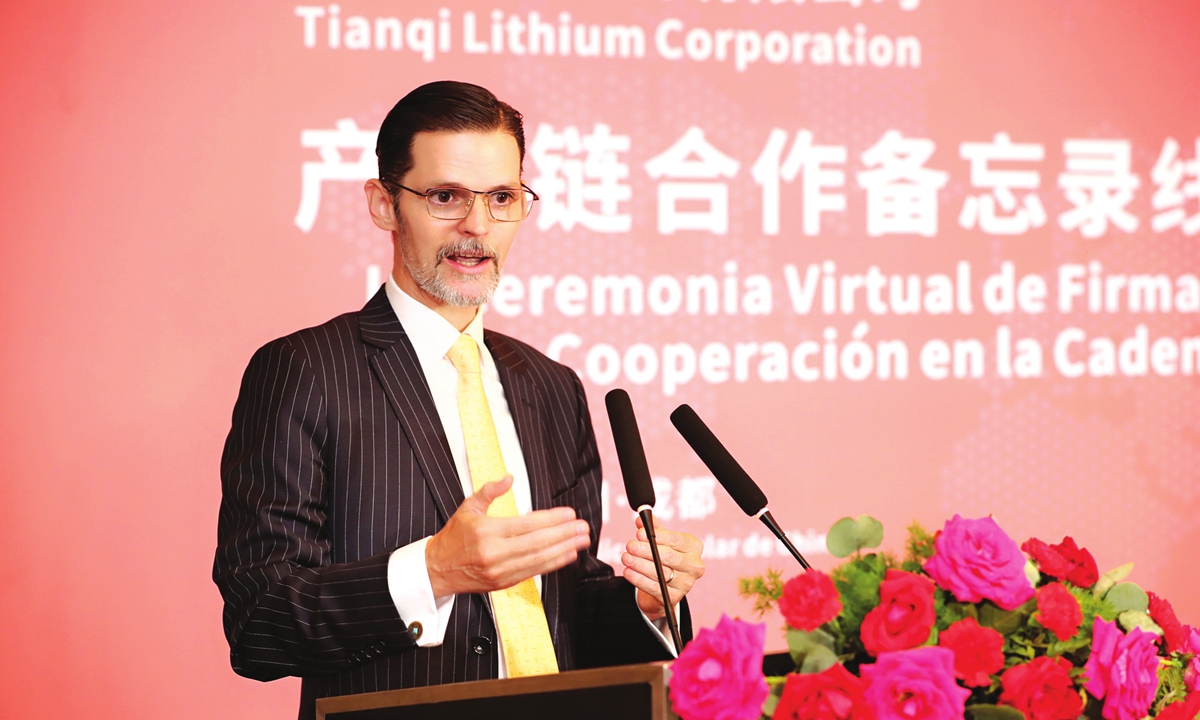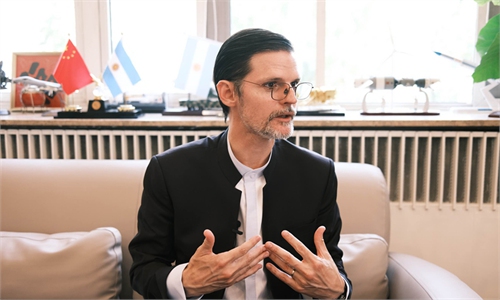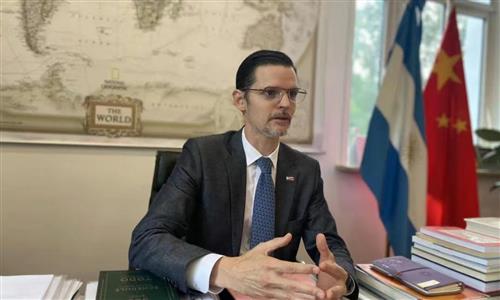
Argentine Ambassador to China Sabino Vaca Narvaja Photo: Courtesy of Argentine Embassy in Beijing
China's commitment to deepening cooperation on services trade and digital trade with Belt and Road partner countries at the 2023 edition of the China International Fair for Trade in Services (CIFTIS) has garnered special attention from Argentina. Argentine Ambassador to China Sabino Vaca Narvaja told the Global Times on Saturday that bilateral cooperation in trade in services will deepen and lead to mutually beneficial outcomes.
The remarks by the Argentine ambassador came as the 2023 edition of CIFTIS, the world's largest services trade fair, wrapped up on Wednesday. The fair resulted in over 1,100 agreements and deals, underscoring China's commitment for wider opening-up and sharing development opportunities with the world.
"We are paying particular attention to President Xi Jinping's announcement that China will accelerate the cultivation of new drivers for the digitization of trade in services, promote pilot reforms of the basic data system, and drive innovative development of digital trade," Narvaja told the Global Times in an exclusive interview.
"I am convinced that the third Belt and Road Forum for International Cooperation, scheduled to be held in Beijing in October with the presence of President Alberto Fernández, will provide an excellent opportunity to continue promoting initiatives to develop trade in services between our countries," Narvaja said.
Argentina is the second-largest exporter of knowledge-based services in Latin America. Therefore, the country's participation in CIFTIS, across all its editions involving both the private sector and the highest authorities, aligns with the strategy developed by the Argentine Embassy in China to promote the export of services and enhance the domestic companies' participation in Chinese fairs, according to the ambassador.
Argentina's strength in services trade stems from a state policy initiated in 2004 with focus on the software and knowledge-based economy. This policy has led to growth in sectors such as audiovisual, biotechnology, bioeconomy, nanotechnology, aerospace and satellite, Industry 4.0 solutions, nuclear technology, and research & development.
"These are the pillars of national growth and an increasingly important part of global trade and we are making strong progress in projects related to biotechnology, agrotechnology, satellite development, and nuclear technology for both energy and medical purposes," Narvaja said.
"For example, the province of Jilin [in Northeast China] is interested in the satellite imagery that the Argentine satellite Saocom-1B can provide for agricultural production, mining, soil condition assessment, and the use of CAREM nuclear reactors for versatile energy supply to industrial centers," the ambassador illustrated.
Cooperation in those sectors is further enhanced by collaboration in cultural industries, tourism services, and software and application development.
"The exchange of experiences and technology transfer between our countries is of vital importance. Argentine companies and agencies, both public and private, with high prestige locally and internationally, maintain relationships with Chinese counterparts and are committed to deepening these ties," he said.
Some of these include Nucleoeléctrica Argentina, ARSAT, CONAE, INTI, IMPSA, NUCLEARIS, Satellogic, and SpaceSUR, which cooperate on scientific and technological projects with Chinese counterparts, noted Narvaja.
Argentina officially joined the Belt and Road Initiative (BRI) in 2022.
"Argentina's inclusion in the BRI will undoubtedly deepen cooperation in these sectors, generating significant added value for our countries," the ambassador said.
A total of 2,400 companies were present at this year's off-line edition of CIFTIS, which has attracted a total of 280,000 visitors, according to the event's organizers.
"China aimed to share the development opportunities of trade in services with all parties by holding the fair, inject new impetus into the global economic recovery and contribute to the trade exchanges," Chinese Foreign Ministry spokesperson Mao Ning said at a regular press conference on Wednesday, commenting on the significance of CIFTIS as the world economy faces an uphill battle in its recovery from the onslaught of pandemic.
China is now the world's fourth-largest exporter and second-largest importer of services, and it is becoming a global center for the supply and demand of services.



